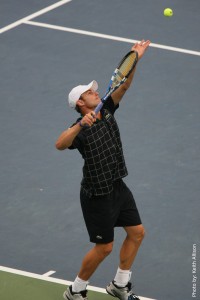
 One of the most difficult things for an athlete to do is to maintain their focus and emotional control when events, out of their control, get in their way. This is a very frustrating experience and it happens a lot – both in sport and in life.
One of the most difficult things for an athlete to do is to maintain their focus and emotional control when events, out of their control, get in their way. This is a very frustrating experience and it happens a lot – both in sport and in life.
I can’t really think of any area of my life where I haven’t experienced some kind of obstacle which prevents me from achieving my goal. Usually with a lot of hard work and some perseverance, it’s possible to overcome the obstacle. However, frustration sets in when that obstacle is out of my control. One example that I experience quite frequently is while driving on busy highways and city streets. I have no control what other drivers do but the decisions they make (e.g., changing lanes without signalling) affect me. It makes my blood boil and I’m sure I’m not alone with this. When this happens to me – when I feel like my anger is going to affect the way I drive my car, I think to myself “Remember the Duck”!
For athletes, examples of those difficult to deal with obstacles are many and easy to find. You see them all the time in media coverage of professional sports. The frustrated baseball manager screaming at the umpire. The unnecessary penalties taken at inopportune times – costing the team the game. Hot buttons for most athletes are poor calls from game officials, cheating by opponents, and play calls or tactical decisions made by coaches. These are all out of your control but can prevent you from reaching your goals.
 Most athletes deal with these frustrations in one of two ways. First, and this is what we see most often on TV, the athlete loses focus on their task and begins to focus on the obstacle, eventually losing their emotional control and making poor decision after poor decision. A prime example was Andy Roddick at this year’s US Open. He was called for a foot fault during an early round match against a lower ranked opponent. He believed that the call was wrong (it wasn’t) and lost focus and control. After berating the line person, Roddick proceeded to drop the next series of points and then the set, followed by the match – an early exit by a top seed.
Most athletes deal with these frustrations in one of two ways. First, and this is what we see most often on TV, the athlete loses focus on their task and begins to focus on the obstacle, eventually losing their emotional control and making poor decision after poor decision. A prime example was Andy Roddick at this year’s US Open. He was called for a foot fault during an early round match against a lower ranked opponent. He believed that the call was wrong (it wasn’t) and lost focus and control. After berating the line person, Roddick proceeded to drop the next series of points and then the set, followed by the match – an early exit by a top seed.
The second way some athletes deal with the frustrations is to quit working. They give up. You don’t see this that often in the media because to get to professional or collegiate sports the athletes generally have a high level of stick-to-itiveness. However, you see this a lot in youth sport and adult recreational competitions. These athletes choose to stop trying to achieve their goal to reduce their frustration. If you no longer have a goal, then you can’t be prevented from reaching it. No frustration. Very poor performance.
So bringing this back to my own driving example, what does “Remember the Duck” have to do with dealing with frustrations? This is all about composure. It’s about maintaining control over your emotions and staying task focused in the most trying of circumstances. Being able to regulate your response to the frustrations will give you an advantage over your competition. An edge they don’t have. It will also prevent road rage and make for a more peaceful drive home.
A duck epitomizes composure. When you look at a duck swimming on a pond, what you see is a calm, cool animal, gliding effortlessly across the water surface. That’s what the duck shows the world. That’s what you need to show the world – focused and in complete control. Now if you were to look at that same duck from underwater, what you see is an animal working like mad to get where it’s going. It’s feet are paddling like crazy. That’s the duck’s secret. You as an athlete need to keep working underneath your calm and cool exterior. You don’t quit. That’s your secret.
I use “Remember the Duck” as a trigger or mantra to remind myself that if I continue to worry about things that are out of my control, I will not be focussing on what I should be worrying about (some aspect of my performance) and I will be letting my opponent control me through my emotions. When I start to feel frustrated I visualize myself as the duck. Moving smoothly and silently across the pond. Knowing that no one knows my secret. That I’m working like mad to reach my goal. I’m focused. I’m in control. I never give up.
When you feel your frustration building and your blood about to boil. Stop. Take a deep breath. And, Remember the Duck!
If you can keep your wits about you while all others are losing theirs, and blaming you. The world will be yours and everything in it, what’s more, you’ll be a man, my son.
-Rudyard Kipling
Leave A Reply (8 comments so far)
The comments are closed.
Mike Gooch
14 years ago
The coolest thing about my sport, agility, is that i have another being to reflect calmness, a sense of security, passion, compassion and love with….my dog.
It’s not an inanimate object. It’s not a golf club, or a baseball bat that i can vent with or on. It is a being that I have shared incredible experiences with, both in and out of the competition realm. THAT is the primary blessing that we can and must celebrate with. That is the magic, like no other sport. And that is the blessing of our partnership, our companionship, and most importantly…our unconditional love.
Gemma Osmond
14 years ago
This post is a very timely reminder to me as I’m starting out on a new agility journey with a young dog at a time when my older and very successful dog is taking time out to have puppies. In trying to get her learning environment just right, quite often other people cause a problem which is outside my control and I get frustrated. Trouble is of course, she doesn’t know it’s not at her. I have a lesson a bit later on this morning and I’m going to keep the image of the duck at the forefront of my mind – thanks John!
Meg
14 years ago
I will definitely remember this the next time I’m in an agility class with my guy and I can’t control everyone else around me! Great suggestion! Does it count if you are sweating on the outside since you’re working so hard on the inside??
Julie Rice
14 years ago
One of the things that distracts me when I’m getting ready to go into the ring for an agility run is a gate steward who is so worried about doing their job properly that they emit serious stress like a cloud. I’m already trying really hard to remain calm and focused so another person screaming my name–especially when I’m standing a few yards away–is really hard to ignore. What are some techniques I can use when I’m distracted by another person who I can’t distance myself from?
John Cullen
14 years ago
Hi Julie,
That’s a great question. We are all, at some point, put in a situation we just can’t avoid. The first thing I would recommend is changing your expectations as you wait for your turn to run. Expect that the gate steward will scream your name and be in a panic if you don’t reply right away. If you expect it you will be able to prepare for it. If it doesn’t happen, then bonus for you. Using mental imagery to refocus your attention on your run can also help get your concentration back after your name is called. You can also develop some performance cues (e.g., “stay connected”, “hold my line”, etc.) you can use to remind yourself of the important things you need to do when your in the ring. Finally, if you find that your anxiety is up after the gate steward calls for you and your dog, try a few slow deep breaths.
Michelle
14 years ago
First I thank Susan G. for this link.
My question…how do you “Remember the Duck” when a person is in your face and you try to step away and regroup they are continuing to yell? Do you just keep going?
John Cullen
14 years ago
Hi Michelle,
That sounds like a very difficult situation. Remembering to “Remember the Duck” does take some practice. Hopefully the first time you need or want to use this trigger phrase isn’t during such a high intensity event as the one you’re describing. Just like anything else that you practice, the more work you put into it, the easier and more natural that response gets. Without fully understanding the whole situation, I would recommend putting some physical distance between yourself and the other person. Their anger is their problem, not yours. If you don’t feel that you’re in any danger (physical or otherwise), your job is to re-focus on the task at hand. Again, composure under fire is a skill that can be learned. You won’t always get it right, but the more you practice, the better you’ll become.
Michelle
14 years ago
Thanks for the feedback. I do understand practice, practice and more practice.
/m